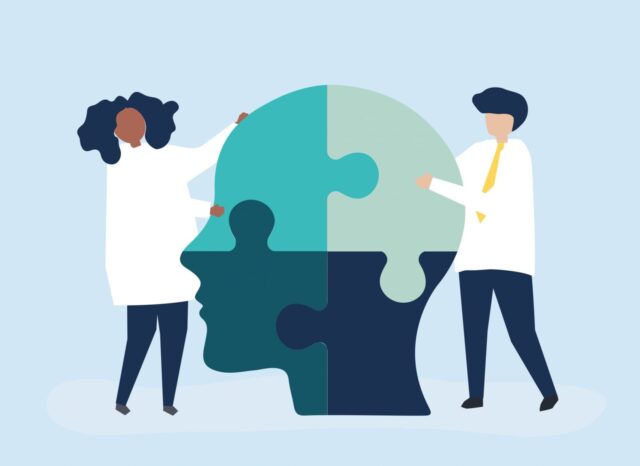
In our bustling lives, where the pace never seems to slow down, prioritizing mental health is crucial for overall well-being. Mental health, often overlooked, plays an integral role in our day-to-day lives. This article delves into why mental health awareness is of paramount importance and how we can nurture it for a fulfilling life.
Understanding Mental Health:
Mental health is not merely the absence of mental illnesses; it encompasses emotional, psychological, and social well-being. It influences how we think, feel, and act, affecting how we handle stress, relate to others, and make choices. Just like physical health, mental health is essential for a productive and satisfying life.

Breaking the Stigma:
Unfortunately, a stigma still surrounds mental health. Many individuals hesitate to seek help due to fear of judgment or societal misconceptions. It’s vital to shatter this stigma and encourage open conversations about mental health. Initiatives like Life Essentials Natural supplements are great resources that advocate for mental health support and guidance.
The Impact of Mental Health on Physical Health:
Mental health is intricately connected to physical health. Chronic stress or anxiety can lead to physical ailments such as cardiovascular issues, weakened immune systems, and digestive problems. Acknowledging and addressing mental health concerns can prevent the escalation of these physical health issues.
The Role of Awareness:
Creating mental health awareness is the first step towards building a society that values mental well-being. Education about mental health, its signs, and available resources can empower individuals to seek help when needed. Initiatives like mental health campaigns, workshops, and online platforms like CBD Products UK provide valuable insights and resources for those struggling with mental health challenges.

Promoting Self-Care:
Self-care practices play a significant role in maintaining good mental health. Engaging in activities that bring joy, setting boundaries, getting adequate rest, regular physical exercise, and nourishing our bodies with a balanced diet are essential components of self-care. It’s vital to prioritize self-care and recognize it as a fundamental aspect of maintaining mental well-being.
Fostering Emotional Resilience:
Embracing mental health awareness also involves cultivating emotional resilience. In today’s fast-paced world, individuals encounter various stressors and setbacks.
Developing emotional resilience equips us with the tools to bounce back from adversity and cope with life’s challenges more effectively. By recognizing the importance of emotional resilience and seeking strategies to enhance it, we can fortify our mental well-being.
Building emotional resilience involves learning to manage and regulate our emotions, developing problem-solving skills, and building a strong support network. Techniques like mindfulness meditation, journaling, and therapy can be instrumental in this journey towards emotional resilience.
The Link Between Sleep and Mental Health:
Adequate sleep is often underestimated when it comes to mental health. Poor sleep can exacerbate symptoms of anxiety and depression, impair cognitive functioning, and contribute to mood disturbances. Understanding the intricate relationship between sleep and mental health is crucial for nurturing overall well-being.
Practicing good sleep hygiene, such as maintaining a regular sleep schedule, creating a comfortable sleep environment, and limiting screen time before bedtime, can significantly improve sleep quality. By prioritizing restful sleep, we take a proactive step in caring for our mental health.

The Influence of Nutrition on Mental Health:
While we often associate nutrition with physical health, it has a significant impact on our mental well-being as well. Nutrient-rich diets that include a variety of fruits, vegetables, whole grains, and lean proteins can positively influence our mood and cognitive function.
Research suggests that certain nutrients, such as omega-3 fatty acids and antioxidants, may have a protective effect on mental health. Understanding the role of nutrition in mental well-being and making informed dietary choices can be a valuable aspect of self-care.
Seeking Professional Help:
Just as we consult a doctor for physical ailments, seeking help from mental health professionals is equally important. Therapists, counselors, and psychologists are trained to help us navigate through challenging times. Their expertise and guidance can make a substantial difference in managing mental health concerns.
Nurturing Mental Health in the Workplace:
The workplace is a significant part of our lives, and it can greatly impact our mental health. Employers and employees alike need to recognize the importance of creating a mentally healthy workplace environment. This includes fostering a culture of open communication, reducing work-related stressors, and offering support mechanisms for employees facing mental health challenges.
Mental health awareness in the workplace can lead to increased job satisfaction, higher productivity, and reduced absenteeism. Employers can implement mental health programs, provide access to employee assistance programs, and promote work-life balance to support their employees’ mental well-being.

Empowering Youth with Mental Health Education:
Mental health awareness should start early, and it is essential to empower young individuals with the knowledge and skills to manage their mental well-being. Schools, parents, and communities play a pivotal role in providing mental health education and support to youth.
Incorporating mental health education into school curricula, organizing workshops on stress management and emotional regulation, and fostering a stigma-free environment can help young people develop resilience and seek help when needed. By investing in the mental health of our youth, we pave the way for a healthier future generation.
Supporting Loved Ones with Mental Health Challenges:
In the journey towards mental health awareness, it’s crucial to extend our support and empathy to those who may be struggling with mental health challenges. Friends and family members can play a pivotal role in providing a safe and non-judgmental space for their loved ones.
Educating ourselves about common mental health conditions, offering a listening ear, and encouraging our loved ones to seek professional help when necessary are all ways we can contribute to their well-being. By fostering a compassionate and supportive community, we create a more inclusive and understanding society.

Conclusion:
The importance of mental health awareness cannot be overstated. It’s a collective responsibility to promote understanding, empathy, and resources that support mental well-being. Let us prioritize mental health, break the stigma surrounding it, and work towards a society that nurtures the mind, ultimately leading to a happier and healthier world.









